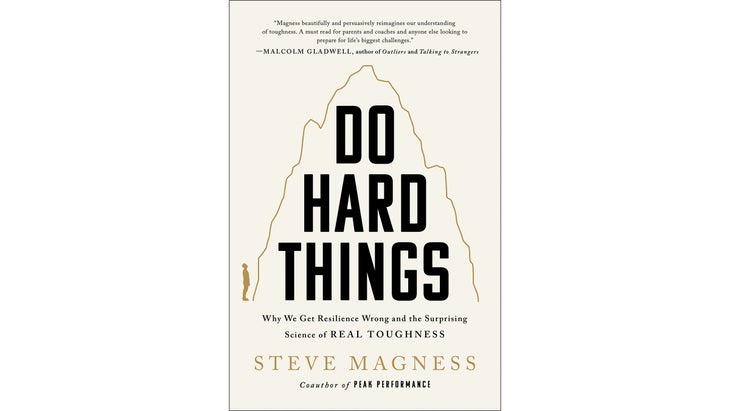It was the night before the NCAA regional cross-country championships, and the team I coach was about to face off against the best runners in Texas, Arkansas, and Louisiana. The women’s team came in with its best ranking in over a decade, led by a strong trio of runners who were on the cusp of achieving all-region status. The only problem: senior Meredith Sorensen was in fantastic shape but suffering from one of the worst cases of performance anxiety I’d ever seen.
Two weeks before, at the conference championship, while standing on the line awaiting the gun to go off, she turned around, puked all over the ground, then started the race. For Meredith, this was normal. She got so nervous that she couldn’t hold her food down. She finished that race in the medical tent with an IV. Now she was cleared physically to race, and I was stumped about how to help her get in a spot where she could compete up to her potential.
I met Andy Stover at a local bar the night before the race. Andy was a former collegiate distance runner, a social worker with a knack for innovative approaches, and also happened to be a groomsman in my wedding. As I relayed all of the traditional techniques I’d tried with Meredith—preparing her for discomfort, visualization, changing her mindset to see anxiety as excitement—he quipped, “Flip the script. Give her back some control.”
Seeing the puzzled look on my face, Andy continued, “If she throws up before every race, it’s become part of the routine. She expects and likely dreads it. So when it happens again and again, all while she’s trying everything she can to prevent it, her brain learns she isn’t in control. Get her to stop fighting herself. Give her back control.”
The next day, as Meredith began her warm-up, she came over and said, “I feel like I’m going to throw up.”
“Good!” I replied. “When do you want to do it?”
Her face turned from worry to puzzlement. “I don’t want to,” she said.
“I know,” I commiserated, “but it’s going to happen. So what time would you like to throw up? Should it be before your jog, after you do your drills, or maybe right before your strides? Where would you like to insert throwing up into your warm-up routine? The race starts at 10 A.M. What time should I schedule your puking for?”
The confused look on her face was still there, but she seemingly accepted and went along with it.
“At 9:45, right before I do my final strides,” she said.
Trying to appear as confident in this crazy idea as possible, I replied, “Great, 9:45 it is. I’ll set my alarm so we both know and can get it done.”
When 9:45 came, my alarm went off, and I walked over to Meredith, telling her it was time to throw up. The only problem was, she didn’t need to. For the first time in several races, no puking occurred. She wasn’t perfect or free of anxiety, but she’d wrestled back enough control that her mind was free to focus on what she was doing and not become preoccupied with the anxiety and puking to come. She went on to have the best race of her career, improving by nearly 20 places over her previous best and just missing out on a coveted all-region spot by a mere few seconds in the 20-minute race.
Whenever we face fear or anxiety, our natural inclination is to tell ourselves to ignore the pain or to relax when nerves have taken over. And more often than not, that attempt to command ourselves to change backfires. We all know this. In the history of telling someone to relax or calm down, has it ever worked?
When our attempt to control the thing backfires, our brain enters the mode of, What’s the point? or Why try? We feel that no matter what we do, we are no longer in control.
A sense of control is the glue that holds our rational brain together when we face challenging times. Without it, we spiral. When we lack control, tasks feel harder, pain feels more intense, and doubts seem louder. Our motivation plummets as we head toward apathy, hopelessness, and a lack of will to act.
It’s nearly impossible to be tough when there’s no hope of navigating your way through the current situation. And that’s the exact signal we send whenever we try to force ourselves to calm down and it inevitably doesn’t work. We aren’t in control—the anxiety is.
Flipping the script is one way we can choose to retake control, so we can keep moving forward. It takes something negative and makes it mundane, something that you are choosing to experience.
Whatever the situation, notice what nudges you toward fear and avoidance. Those triggers are often a signal that we need to change the narrative. When we flip the script, we take away the power of the thing that makes us anxious. We give ourselves permission to do something we thought was negative.
“The desire for control is not something we acquire through learning, but rather, is innate, and thus likely biologically motivated. We are born to choose,” researchers Lauren Leotti, Sheena Iyengar, and Kevin Ochsner concluded in a for Trends in Cognitive Sciences. Choice allows us to take back control. It’s a kind of superpower that brings back confidence, helps us wrestle with our emotions, and allows us to learn, adapt, and grow.
Whenever you face a challenge that causes anxiety and fear, consider flipping the script. Move from avoidance to acceptance, from being a prisoner of the stress to recognizing that you have the power to meet it on your terms. Often this subtle shift provides us with the freedom to perform.

Excerpted and adapted from , by Steve Magness, and reprinted with permission from HarperOne, an imprint of HarperCollins Publishers. Copyright 2022.


